Results
-
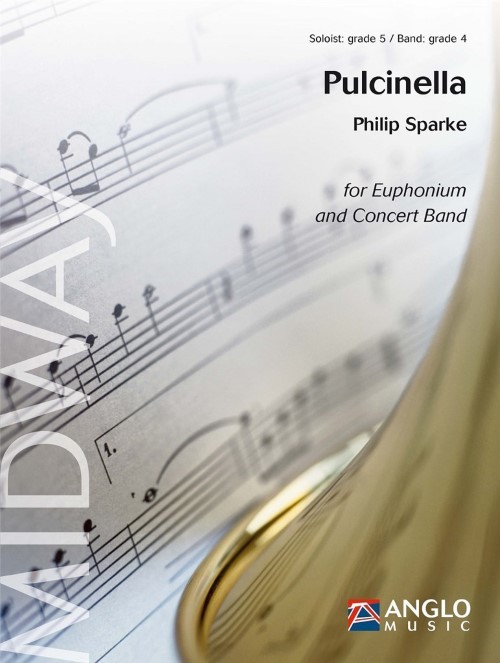 £141.99
£141.99Pulcinella (Euphonium Solo with Concert Band - Score and Parts) - Sparke, Philip
Pulcinella was commissioned by the Taiwanese euphonium player Tzu-Hsiang Lin. Lin is a renowned soloist and teacher and a Besson Euphonium Artist. He teaches euphonium at Taipei National University of the Arts, National Taiwan University of Arts, Shih Chien University and National Kaohsiung Normal University. Lin gave the premiere of Pulcinella in both its concert band and brass band versions in January 2021. Pulcinella continues Sparke's series of euphonium solos named after characters of the Italian commedia dell'arte and opens with a long and expressive minor melody for the soloist over a brooding accompaniment. This is taken up briefly by the full band and is extended by the soloist after a change of key. A cadenza, accompanied by fragments of the main melody leads to a complete change of mood, tempo and tonality, introducing a Vivo section starting with a perky syncopated tune for the soloist. The band then uses elements of this new tune to introduce a change of key, where the soloist introduces a more lyrical second subject over a pulsing accompaniment. The band then takes this up and changes key to reintroduce the original Vivo melody, which leads to a short and acrobatic coda to bring the work to a spectacular close. Duration: 6.45
Estimated dispatch 7-14 working days
-
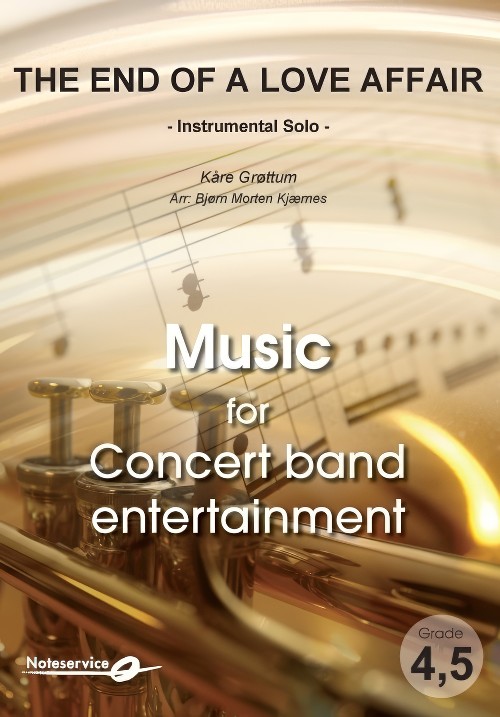 £91.00
£91.00The End of a Love Affair (Flexible Instrument Solo with Concert Band - Score and Parts) - Grottum, Kare - Kjaernes, Bjorn Morten
Kare Grottum is known to most as a pianist and producer by NRK. He was involved in numerous TV productions, both as producer, musician, composer, and arranger. This tune is taken from a CD released in 1992, Fra en musikers dagbok where he brings with him several Norwegian soloists of international class. It is Erling Wicklund who does a brilliant solo on Flugabone which has also used as a starting point for the written improvisation. The arrangement should be played in a slightly swinging way, but not as much as a jazz waltz. Play with the straight eighths and then let it flow, with a faint two against three feeling, which clearly shows up in some places. If you do not have bassoon and oboe, let alto sax and tenor sax make up the duet from 9. Enjoy! Solo Options: C BC Instruments; Bb TC Instruments; Eb TC Instruments. Duration: 4.15
Estimated dispatch 7-14 working days
-
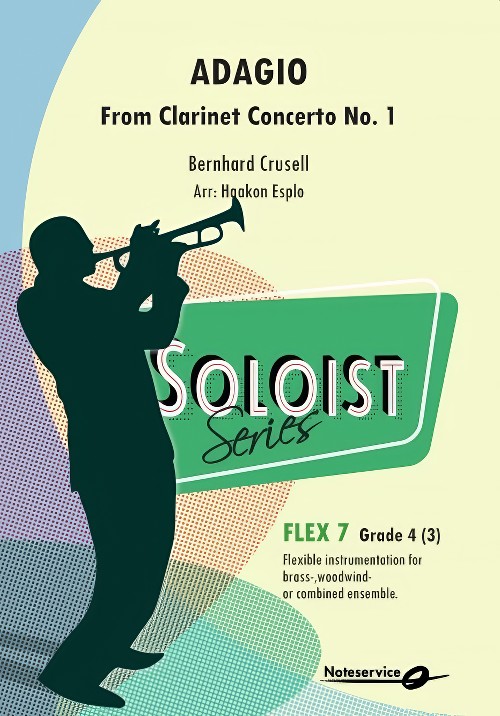 £77.00
£77.00Adagio (from Clarinet Concerto No.1) (Clarinet Solo with Flexible Ensemble - Score and Parts) - Crusell, Bernhard - Esplo, Haakon
The Finnish-Swedish clarinetist and composer Bernhard Crusell (1775-1838) was born in Nystad in a poor family of bookbinders. He started studying clarinet in Stockholm at a young age and established himself as a clarinet soloist and was appointed director of the regimental band as a 16-year-old. The following year he became a solo clarinetist in the Royal Court Orchestra, which was conducted by his composition teacher Abb? Vogler. Crusell was offered positions as a musician in other orchestras in Europe, but King Gustav IV Adolf wanted to keep him in the Royal Orchestra and gave the job as chief conductor of the bodyguard regiment's band. Bernhard Crusell composed a lot of music for both orchestra, ensembles and singers. This beautiful adagio is from his first of a total of three clarinet concerts. Duration: 3.45
Estimated dispatch 7-14 working days
-
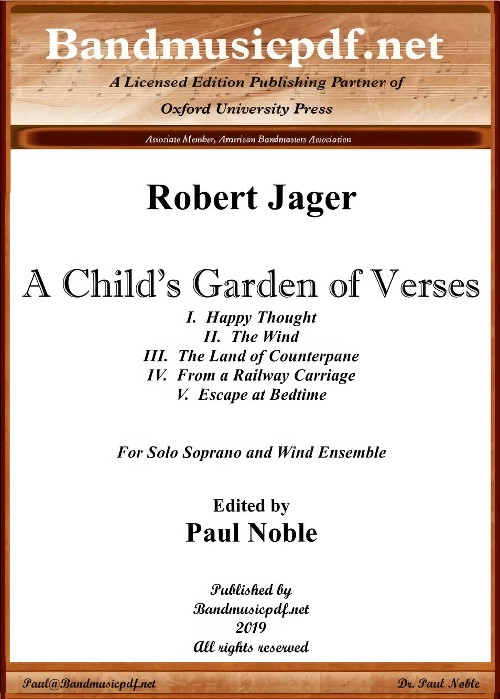 £150.00
£150.00A Child's Garden of Verses (Soprano Solo with Concert Band - Score and Parts) - Jager, Robert - Noble, Paul
A Child's Garden of Verses has a very special meaning for me. Bob Jager, a family friend, was visiting in our home, and my wife, Mitzi Noble, a soprano soloist, was singing to his children. Bob's two young children became so enthralled with the music that Bob wanted to capture that moment. So he composed this piece for Mitzi, and dedicated it to his children, Kathleen and Matthew. The text is from Robert Louis Stevenson's poems: I. Happy Thought; II. The Wind; III. The Land of Counterpane; IV. From a Railway Carriage; V. Escape at Bedtime. Bob writes: The ideal performance instrumentation would be one on a part. If a larger group is used the balance should be kept proportional. In a few places the terms Solo or One are used where the sonority is critical, and this should be strictly followed. Above all, the singer should never feel forced by the ensemble. This work was composed in 1972, and was never published. I am pleased that Bob has allowed me now to publish it under Noble Music Publications, so that it may be available for others to perform and enjoy. Mitzi writes: Although we did not have access at the time, the ideal performance would be with a throat mic so that the soloist is free to move around the stage and sing, as though singing and relating to children sitting on the front row.
Estimated dispatch 7-14 working days
-
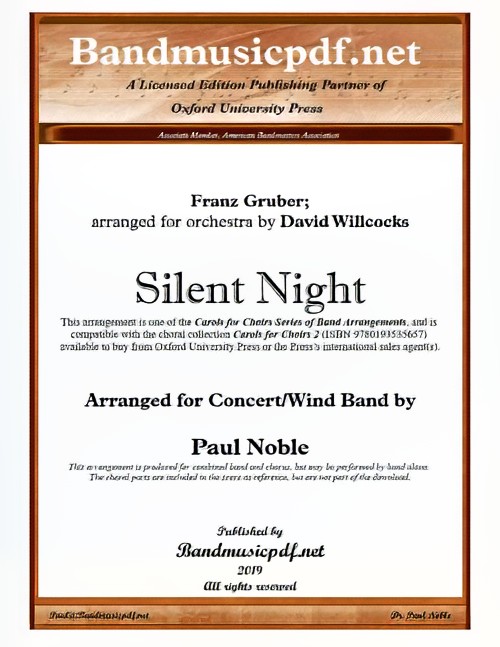 £75.00
£75.00Silent Night (Concert Band with Optional Choir - Score and Parts) - Gruber, Franz - Noble & Willcocks
Silent Night (German: Stille Nacht, heilige Nacht) is a popular Christmas carol, composed in 1818 by Franz Xaver Gruber to lyrics by Joseph Mohr in the small town of Oberndorf bei Salzburg, Austria. It was declared an intangible cultural heritage by UNESCO in 2011. Over the years, because the original manuscript had been lost, Mohr's name was forgotten and although Gruber was known to be the composer, many people assumed the melody was composed by a famous composer, and it was variously attributed to Haydn, Mozart, or Beethoven. However, a manuscript was discovered in 1995 in Mohr's handwriting and dated by researchers as c. 1820. It states that Mohr wrote the words in 1816 when he was assigned to a pilgrim church in Mariapfarr, Austria, and shows that the music was composed by Gruber in 1818. This is the earliest manuscript that exists and the only one in Mohr's handwriting. The song has been recorded by a large number of singers across many music genres. This haunting setting by David Willcocks also includes slight textual alterations to the piece that has been translated into about 140 languages. This arrangement represents one in the Series of Band Arrangements compatible with David Willcocks' Carols for Choirs.
Estimated dispatch 7-14 working days
-
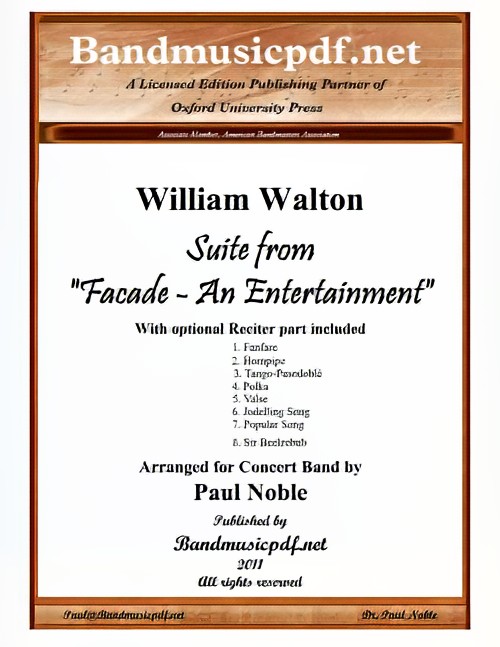 £375.00
£375.00Facade - An Entertainment, Suite from (Concert Band with Optional Narrator - Score and Parts) - Walton, William - Noble, Paul
This Suite from Facade - An Entertainment, composed by William Walton, with poems by Dame Edith Sitwell, presents for the first time a grouping of movements selected and arranged by Paul Noble for Concert Band and optional Reciter. The original composition was written between 1921 and 1928, containing forty-three numbers. They had their origin in a new style of poetry that Edith Sitwell evolved in the early 1920s, poems that her brother Osbert later described as 'experiments in obtaining through the medium of words the rhythm and dance measures such as waltzes, polkas, foxtrots... Some of the resulting poems were sad and serious... Others were mocking and gay... All possessed a quite extraordinary and haunting fascination.' Possibly influenced by the dance references in some of the numbers, Osbert declared that the poems might be further enhanced if spoken to a musical accompaniment. The obvious choice of composer was the young man who lived and worked in an attic room of the Sitwell brothers' house in Carlyle Square W[illiam] T[urner] Walton, as he then styled himself. The now historic first performance of the Facade Entertainment took place in an L-shaped first-floor drawing-room on January 24, 1922. Accompaniments to sixteen poems and two short musical numbers were performed by an ensemble of five players. The performers were obscured from the audience by a decorated front curtain, through which a megaphone protruded for Edith to declaim her poems. This was, as she put it, 'to deprive the work of any personal quality'. The first public performance of Facade was given at the Aeolian Hall on June 12, 1923. By now, fourteen poems had been set, others revised or rejected, and an alto saxophone added to the ensemble. The occasion gave rise to widespread publicity, both pro and contra, and the name of the twenty-one year old W. T. Walton was truly launched. In the ensuing years the Facade has gone through revisions and additions, with full orchestral arrangements of selected movements being made without the Reciter. Former Band Director Robert O'Brien arranged some movements for band, again without Reciter, which are now out of print. So this 'history making' addition is the first opportunity for Concert Bands to present some movements of Facade with poems as originally intended. The luxury of electronic amplification allows the full ensemble to perform without necessarily overshadowing the Reciter. And the arrangements are written with considerable doubling so that the ensemble may play in full, or reduced in size as may be desired for proper balance. And, though not encouraged, the arrangements are written so that the band can perform the music without the Reciter. Program notes are adapted in part from those written by David Lloyd-Jones and published by Oxford University Press in the Study Score of William Walton's Facade Entertainments.
Estimated dispatch 7-14 working days
-
 £104.99
£104.99Latin Pop Special (Concert Band - Score and Parts) - Myokoin, Masato
At the end of the nineties Porto Rican born singer Ricky Martin started a new trend in the world of pop music - Latino-pop. In 1996 he conquered the world with his catchy single Livin la vida loca, which went to number one in many countries, including five weeks at the top spot in the USA. Today he has sold more than 48 million albums making him one of the most successful pop artists of recent times. Latin Pop Special combines two of the most popular songs from this superstar of Latin music!Duration: 5:30
Estimated dispatch 7-14 working days
-
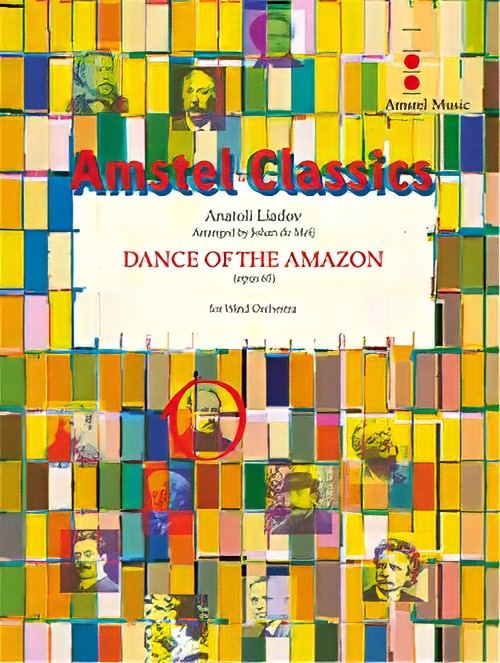 £111.00
£111.00Dance of the Amazon (Concert Band - Score and Parts) - Lyadov, Anatoly - De Meij, Johan
The Russian composer Anatoly Lyadov was one of Rimski-Korsakov's talented students and was also a respected conductor. Lyadov's compositions are relatively few, as he did not complete many of his works. One of the pieces he did complete was called Dance of the Amazon, which was written for the dancer Ida Rubinstein. Johan de Meij's arrangement makes this charming work, based on two Greek folk melodies, accessible to concert bands for the first time ever! Duration: 3.30
Estimated dispatch 7-14 working days
-
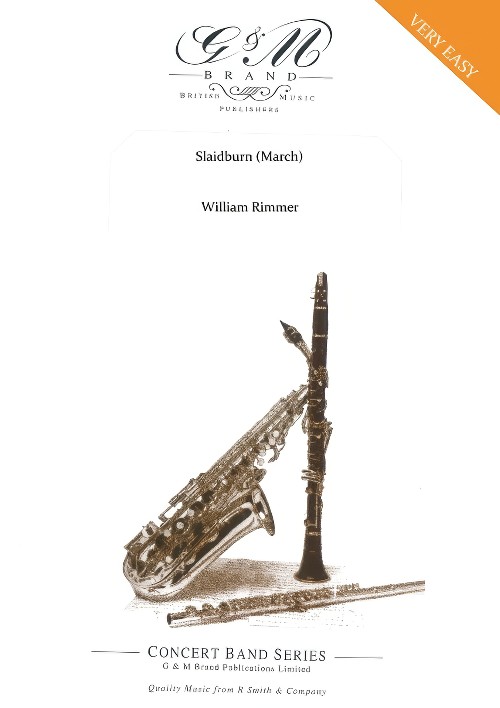 £44.95
£44.95Slaidburn (March) (Concert Band - Score and Parts) - Rimmer, William - Brand, Michael
For many, Lancastrian William Rimmer is Britain's 'March King.' His marches are wonderful, every one with its own unique personality and form. Like Sousa, he also created and played a vast catalogue of band music ranging from waltzes and solos to great selections from the masters, but it is for his marches that he is remembered today. Slaidburn is a village in the county of Lancashire, England, but was originally part of the West Riding of Yorkshire. Rimmer composer this easy but effective and much-loved march for the village band.
Estimated dispatch 7-14 working days
-
 £8.95
£8.95Slaidburn (March) (Concert Band - Score Only) - Rimmer, William - Brand, Michael
For many, Lancastrian William Rimmer is Britain's 'March King.' His marches are wonderful, every one with its own unique personality and form. Like Sousa, he also created and played a vast catalogue of band music ranging from waltzes and solos to great selections from the masters, but it is for his marches that he is remembered today. Slaidburn is a village in the county of Lancashire, England, but was originally part of the West Riding of Yorkshire. Rimmer composer this easy but effective and much-loved march for the village band.
Estimated dispatch 7-14 working days
